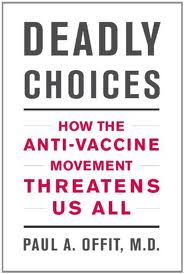January 31st, 2011 by Bryan Vartabedian, M.D. in Book Reviews, Opinion
No Comments »

 A friend suggested she was tired of hearing about vaccines. Her comment and our subsequent conversation seemed to reflect an important shift in parent sentiment: The conversation about vaccines is beginning to get somewhere.
A friend suggested she was tired of hearing about vaccines. Her comment and our subsequent conversation seemed to reflect an important shift in parent sentiment: The conversation about vaccines is beginning to get somewhere.
While much of this was born of the mainstream media’s newfound realization that the vaccine-autism connection was cooked, some of this is due to the tireless work of those like the Children’s Hospital of Philedelphia’s Dr. Paul Offit who get the story right.
As part of his passionate agenda to expose vaccine truths, he’s published “Deadly Choices: How the Anti-vaccine Movement Threatens Us All” (Basic Books, 2011). For those looking to understand the origins of anti-vaccine sentiment, read this book.
What struck me is the deep history behind the anti-vaccine movement. From Jenner’s smallpox fix to modern-day MMR struggles, Offit draws fascinating corollaries surrounding immunization that seem to defy the generations. Vaccine resistance was not born of Andrew Wakefield, but broader concerns rooted in religion, individual liberty, fear and propaganda. “Deadly Choices” puts the anti-vaccine movement in a historic sequence that reads like good suspense. I couldn’t put it down. Read more »
*This blog post was originally published at 33 Charts*
November 26th, 2010 by RyanDuBosar in Better Health Network, Health Policy, News
No Comments »

Potential health effects of airport security are being questioned for their possible health consequences, from spreading germs to radiation exposure to the stress that being searched induces.
With cheaper flights available this year and the need for security in air travel, the Transportation Security Administration (TSA) is justifying its full body scans and its pat-downs that rise up travelers’ legs — all the way up.
The scanners use microwaves, leading some to question whether people may be receiving too much radiation. It’s also a concern to activists who may have already undergone a lot of radiation for existing condition, or who have other conditions for which TSA agents may not be trained. (Read one seasoned traveler’s personal experience here.) The TSA reports the scanners expose users less energy than a cell phone.
Some protesters refused the body scans in favor of a pat-down, in an effort to tie up air travel on the day before Thanksgiving and force a review on the issue. But a manual exam spreads germs, say others.
Amid all the speculation of potential health consequences, federal officials are reminding travelers that the security measures are there for passenger safety. However, retorts Jason Mustian‘s Twitter feed, “Body scans and genital fondlings would save more lives if our government was paying to have them done in hospitals rather than airports.”
*This blog post was originally published at ACP Internist*
October 31st, 2010 by Stanley Feld, M.D. in Better Health Network, Opinion
No Comments »

 To: Bud Selig, Commissioner of Baseball
To: Bud Selig, Commissioner of Baseball
Dear Mr. Selig:
The World Series is an exciting time. It’s important to promote the national pastime. Kids play baseball all over the world. I have been particularly interested in the post-season games this season because my home team, the Texas Rangers, is in the World Series. They have been playing magnificent baseball.
I have been both a Yankees and Rangers fan ever since the Rangers came to Texas. In fact, my brother and I went to the first Rangers game in Arlington Stadium. I have been a student of baseball strategy for many years. Baseball is a fantastic game.
Baseball players are role models to kids all over the world. A baseball player’s behavior on the playing field should be exemplary. Baseball players have been poor role models as far as spitting and scratching their crotch. I have never become immune to these tasteless rituals. Read more »
*This blog post was originally published at Repairing the Healthcare System*
June 30th, 2010 by Davis Liu, M.D. in Better Health Network, Health Tips, News, Opinion, Research
No Comments »

California recently declared an epidemic of whooping cough (pertussis) which resulted in the death of five infants under the age of 3 months. The pertussis vaccine, which is already given routinely to infants, is first given at 2 months of age, then 4 months and 6 months of age, with an additional booster at 15 to 18 months of age, and then again at 4 to 6 years old.
The vaccines for Bortella pertussis bacteria, which causes whooping cough, does not confer lifelong immunity. In other words, fully-vaccinated children who then become teenagers and then adults lose immunity, can acquire the infection and then spread it. Should babies acquire pertussis, as the public has discovered, it can be deadly. The persistent cough tires the baby, causes difficulty breathing, and can make them turn blue or cyanotic resulting in pneumonia or convulsions. According to CDC, about half of children aged 1 year and younger need to be hospitalized if infected with the illness. Although older children and adults can handle the cough, the infection can cause them to cough for weeks or months. Read more »
*This blog post was originally published at Saving Money and Surviving the Healthcare Crisis*
 A friend suggested she was tired of hearing about vaccines. Her comment and our subsequent conversation seemed to reflect an important shift in parent sentiment: The conversation about vaccines is beginning to get somewhere.
A friend suggested she was tired of hearing about vaccines. Her comment and our subsequent conversation seemed to reflect an important shift in parent sentiment: The conversation about vaccines is beginning to get somewhere.













